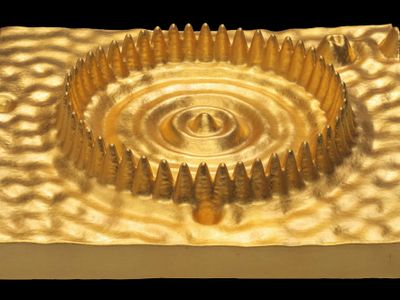Basic statistical physics, molecular dynamics,
Monte Carlo methods, overview of quantum mechanics, band structure, Fermi level, the nature of the chemical binding, density functional theory, calculation of structural stability in metals and alloys and energy for different defects.
Calculation of mechanical and electric properties, simulation of phase transitions.
Accuracy and limitations of the technology.
Overview of softwares.
MH2046 Quantum Metallurgy 6.0 credits

Materials science is a very fast developing subject. The ever increasing computer power allows a detailed study of materials at different spatial and temporal scales. In such a hierarchical modeling, one scale is certainly special: an atomic scale at the electronic structure level. This is the starting point for all the other scales and this is where accurate physical theory can be applied to learn what happens in materials in details, not accessible by other theoretical and experimental tools.
First-principles methods are not only standard tools for a deep-level investigation in materials science nowadays, but they are becoming an important component of an intelligent design of new materials in industry.
This course is to be considered as an INTRODUCTION into the field of first-principles calculations, with the purpose of spreading knowledge (not legends) about this type of computational tools.
The main concentration is on understanding the general idea behind first-principles methods, their weak and strong sides, solved and unsolved problems. Student will learn what kind of materials science problems can be tackled using first-principles methods and how such methods can be used.What is possible and trustable, and what is still not.
(The picture is the art-work "Quantum corral" by Julian Vass-Andrea, representing electron density wave of Fe atoms on Cu surface. Credit: www.JulianVossAndreae.com)
Information per course offering
Information for Autumn 2026 Start 26 Oct 2026 programme students
- Course location
KTH Campus
- Duration
- 26 Oct 2026 - 11 Jan 2027
- Periods
Autumn 2026: P2 (6 hp)
- Pace of study
33%
- Application code
10878
- Form of study
Normal Daytime
- Language of instruction
English
- Course memo
- Course memo is not published
- Number of places
Min: 10
- Target group
- Open for application for TTMVM grade 1-2. Elective for all programs, provided that the course can be included in the program.
- Planned modular schedule
- [object Object]
- Schedule
- Schedule is not published
- Part of programme
Contact
Course syllabus as PDF
Please note: all information from the Course syllabus is available on this page in an accessible format.
Course syllabus MH2046 (Autumn 2023–)Content and learning outcomes
Course contents
Intended learning outcomes
After passing the course, the participant should be able to:
- Apply the basic principles of quantum metallurgical strategies and its limitations with regard to the size of the evaluated systems and the time scale
- Identify which type of materials science problem (threshold displacement energy, mechanical, kinetic etc) that is possible to solve or can be solved by means of ab initio tools, and reach the expected precision and the reliability for ab initio modelling for different properties and materials
- Justify and use one of the available ab initio programs, install the structure for the corresponding ab initio modelling and select the main parameters for first principle calculations
Literature and preparations
Specific prerequisites
Basic knowledge about quantum mechanics and the Schrödinger equation as well as ab initio calculations and density-functional theories (DFT) equivalent to MH1026 Materials Physics, 6 higher education credits.
Literature
Examination and completion
Grading scale
Examination
- PRO1 - Project Assignment, 6.0 credits, grading scale: A, B, C, D, E, FX, F
Based on recommendation from KTH’s coordinator for disabilities, the examiner will decide how to adapt an examination for students with documented disability.
The examiner may apply another examination format when re-examining individual students.
If the course is discontinued, students may request to be examined during the following two academic years.
Examiner
Ethical approach
- All members of a group are responsible for the group's work.
- In any assessment, every student shall honestly disclose any help received and sources used.
- In an oral assessment, every student shall be able to present and answer questions about the entire assignment and solution.